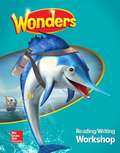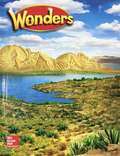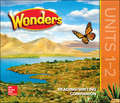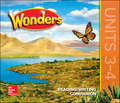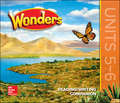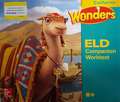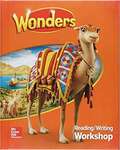- Table View
- List View
Wonders [Grade 2], Reading/Writing Companion, Unit 1
by McGraw-Hill EducationNIMAC-sourced textbook
Wonders [Grade 2], Reading/Writing Workshop
by Donald R. Bear Janice A. Dole Diane AugustNIMAC-sourced textbook
Wonders [Grade 2], Unit 1, ELD Companion Worktext
by Jana Echevarria Josefina V. Tinajero Diane AugustNIMAC-sourced textbook
Wonders [Grade 2], Unit 2, ELD Companion Worktext
by Jana Echevarria Josefina V. Tinajero Diane AugustNIMAC-sourced textbook
Wonders [Grade 2], Unit 3, ELD Companion Worktext
by Jana Echevarria Josefina V. Tinajero Diane AugustNIMAC-sourced textbook
Wonders [Grade 2], Unit 4, ELD Companion Worktext
by Jana Echevarria Josefina V. Tinajero Diane AugustNIMAC-sourced textbook
Wonders [Grade 2], Unit 5, ELD Companion Worktext
by Jana Echevarria Josefina V. Tinajero Diane AugustNIMAC-sourced textbook
Wonders [Grade 2], Unit 6, ELD Companion Worktext
by Jana Echevarria Josefina V. Tinajero Diane AugustNIMAC-sourced textbook
Wonders [Grade 3, Literature Anthology]
by Jana Echevarria Douglas Fisher Timothy Shanahan Diane August David Francis Vicki Gibson Jan Hasbrouck Donald Bear Josefina Tinajero Kathy BumgardnerNIMAC-sourced textbook
Wonders [Grade 3] Reading/Writing Companion, Units 1–2
by McGraw-Hill EducationNIMAC-sourced textbook
Wonders [Grade 3] Reading/Writing Companion, Units 1–2
by McGraw-Hill EducationNIMAC-sourced textbook <P><P>Wonders Grade 3 Reading/ Writing Companion Units 1-2: This interactive student edition ensures students read with pencil in hand, collaborate with partners, and write whenever they read. Students master the close reading routine, respond to texts, apply skills and strategies, talk, cite text evidence, and write.
Wonders [Grade 3] Reading/Writing Companion, Units 3–4
by McGraw-Hill EducationNIMAC-sourced textbook
Wonders [Grade 3] Reading/Writing Companion, Units 3–4
by McGraw-Hill EducationNIMAC-sourced textbook <P><P>Wonders Grade 3 Reading/ Writing Companion Units 3-4: This interactive student edition ensures students read with pencil in hand, collaborate with partners, and write whenever they read. Students master the close reading routine, respond to texts, apply skills and strategies, talk, cite text evidence, and write.
Wonders [Grade 3] Reading/Writing Companion, Units 5–6
by McGraw-Hill EducationNIMAC-sourced textbook
Wonders [Grade 3] Reading/Writing Companion, Units 5–6
by McGraw-Hill EducationNIMAC-sourced textbook <P><P>Wonders Grade 3 Reading/ Writing Companion Units 5-6: This interactive student edition ensures students read with pencil in hand, collaborate with partners, and write whenever they read. Students master the close reading routine, respond to texts, apply skills and strategies, talk, cite text evidence, and write.
Wonders [Grade 3], ELD Companion Worktext
by Jana Echevarria Josefina V. Tinajero Diane AugustNIMAC-sourced textbook
Wonders [Grade 3], Reading/Writing Workshop
by Donald R. Bear Janice A. Dole Diane AugustNIMAC-sourced textbook
Wonders [Grade 3], Unit 1, ELD Companion Worktext
by Jana Echevarria Josefina V. Tinajero Diane AugustNIMAC-sourced textbook
Wonders [Grade 3], Unit 2, ELD Companion Worktext
by Jana Echevarria Josefina V. Tinajero Diane AugustNIMAC-sourced textbook
Wonders [Grade 3], Unit 3, ELD Companion Worktext
by Jana Echevarria Josefina V. Tinajero Diane AugustNIMAC-sourced textbook
Wonders [Grade 3], Unit 4, ELD Companion Worktext
by Jana Echevarria Josefina V. Tinajero Diane AugustNIMAC-sourced textbook
Wonders [Grade 3], Unit 5, ELD Companion Worktext
by Jana Echevarria Josefina V. Tinajero Diane AugustNIMAC-sourced textbook
Wonders [Grade 3], Unit 6, ELD Companion Worktext
by Jana Echevarria Josefina V. Tinajero Diane AugustNIMAC-sourced textbook

